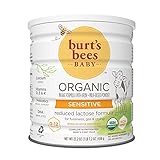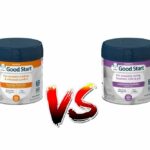Any new mom will know just how hard those early days can be. If you find your baby just won’t settle, has increased gas and discomfort then it may be worth considering if their formula is right for them.
Many times it can take a couple of tries to find a formula that works well for your baby without upsetting their sensitive little tummies.
In this article, we will be covering what to look out for and really going into detail about 5 of the best formulas for babies with sensitive stomachs or difficulty digesting their current brand.
Short On Time? Here Are Our Top 3 Choices
| Title | Price | Prime | Buy | |
|---|---|---|---|---|
Top Top
Top Top
Top | Mama Bear Sensitivity Baby Formula Powder With Iron | PrimeEligible | Buy Now | |
 Top
Top Top
Top | Burt's Bees Baby Organic Sensitive Infant Formula with Iron | PrimeEligible | Buy Now | |
 Top
Top Top
Top | Similac Pro-Total Comfort Non-GMO with 2'-FL HMO Infant Formula with Iron | PrimeEligible | Buy Now |
What Do I look Out For In A Good Formula Brand?
It can be overwhelming to see so many claims and promises on your baby’s formula box, how do you know what’s best for your little one and what do you need to look out for?
There are several pointers to look out for in a good formula, here are a few pointers. It is important to pick a formula that will help your baby with specific issues such as gas, intolerance, or colic.
Nutrients
It’s very easy to get sucked in by a formula’s packaging or bright colors and claims. But arguably the most important thing to look out for is the ingredients and minerals included in the formulation.
Ninety-eight percent of infant formula is just protein, carbohydrates, and fat. The protein and carbs have the most impact on your little ones’ tummies when being digested, so it’s important you get it right to avoid discomfort and excess gas for your baby.
It is also important to look out for certain ingredients that are a big no-no. These include corn syrup, high fructose corn syrup & any other added sugars.
You do not need to add any sugar or sweeteners to your baby’s diet and this can cause health issues for them in the future.
Additionally, you should look out for any artificial colorings & synthetic flavors as this has been linked to an increased likelihood of behavioral disorders.
It has also been found that the inclusion of palm oil restricts an infant’s ability to absorb iron content, which is essential for growth, development, and their developing immune system.
Certification
Another important thing to look for when choosing a formula is the brand’s certification. This means the brand has been safety tested and you can rest assured knowing it contains all the right things your child will need to grow healthily.
The first thing to look for is USDA certification. This is the U.S Department of Agriculture, they check all ingredients are grown in synthetic fertilizer and pesticide-free soil, as well as being free of artificial colors, flavors, and preservatives.
Some further things to look for are;
- Probiotics – These are vital for ease of digestion and boosting their immune system
- Safe packaging – Be sure there is no BPA present.
Easy Digestion
View in gallery
Lots of grunting, gas, and discomfort can often be a sign your baby is having trouble digesting its current formula.
Some brands on the market advertise easy digestion, but it is important to figure out what aspects of the formula are causing these issues for your little one.
Most babies can handle cow’s milk formula without any issues, but a small percentage may not be able to for a couple of reasons. This could be lactose intolerance or a possible underlying allergy.
If you suspect either of these issues is to blame you can contact your pediatrician for more advice and maybe try switching over to a lactose/dairy-free formula mix.
Possible Allergens
As we just mentioned, it is important to not rule out the chance your baby could be allergic to certain ingredients in your current formula. Signs of this include;
- Excessive gas
- Obvious discomfort shortly after starting/ finishing a feed
- Unusual stools
- Frequent spit-up
- Rashes
- In severe cases, anaphylaxis
There are several things your little one could be allergic to in the formula, from lactose to soy or even wheat. Your doctor should be able to give you more information on allergens if you feel this is something your baby may be suffering from.
Related Reading: 5 Uses for Expired Baby Formula
Our Top 5 Formula For Sensitive Stomachs And Easy Digestion
With all the basics covered, we have compiled a list of our top 5 formulas to ease digestion on sensitive tummies, with some suitable for those babies with allergens too.
1. Mama Bear Sensitivity
This formula is specifically designed for babies who have a sensitivity to lactose and helps to reduce your baby’s fussiness and gas. It also contains 2′-FL HMO which is a prebiotic commonly found in 80% of breastfeeding mothers.
HMO’s are the third most abundant ingredient in breastmilk so it’s perfect for your little one.
With no genetically engineered ingredients or artificial growth hormones, this formula is a great, gentle choice on your little ones growing tummy so you can rest assured they are getting all the good stuff and no nasties.
Prices pulled from the Amazon Product Advertising API on:
Product prices and availability are accurate as of the date/time indicated and are subject to change. Any price and availability information displayed on [relevant Amazon Site(s), as applicable] at the time of purchase will apply to the purchase of this product.
2. Burt’s Bees Baby Organic Sensitive
This formula from Burt’s Bees Baby range is USDA certified Organic and it has no added hormones, genetic engineering, preservatives, or antibiotics.
With organic, plant-based oils and vitamins D, E & K this formula is perfect for babies with sensitive tummies. It also has 74% less lactose than its other formula ranges.
Prices pulled from the Amazon Product Advertising API on:
Product prices and availability are accurate as of the date/time indicated and are subject to change. Any price and availability information displayed on [relevant Amazon Site(s), as applicable] at the time of purchase will apply to the purchase of this product.
3. Similac Pro-Total Comfort
This tried and tested brand says parents reported a significant reduction in fussiness and gas after just one day of switching to this formula!
With a gentle-on-tummies formula & easy digestion, this is another high contender to help your little ones tummy troubles. This formula also contains Prebiotics found in higher levels of breastmilk so the immune nourishing ingredients may just help to solve your feeding issues.
Prices pulled from the Amazon Product Advertising API on:
Product prices and availability are accurate as of the date/time indicated and are subject to change. Any price and availability information displayed on [relevant Amazon Site(s), as applicable] at the time of purchase will apply to the purchase of this product.
4. Enfamil ProSobee Simply Plant Based
This is one of our allergy-friendly formula options, with no lactose or dairy this fully soy & plant-based formula by Enfamil helps to support immune health whilst providing the same nourishing DHA levels as any dairy-based formula on the market.
Some moms have found soy protein has helped to ease their baby’s sensitive tummies and with no dairy, this is much easier to digest leaving your little one happy and healthy.
Prices pulled from the Amazon Product Advertising API on:
Product prices and availability are accurate as of the date/time indicated and are subject to change. Any price and availability information displayed on [relevant Amazon Site(s), as applicable] at the time of purchase will apply to the purchase of this product.
5. Enfamil Nutramigen Hypoallergenic
Finally on our list is another allergy-friendly blend from Enfamil. With claims to relieve colic in 48hrs, this blend is designed for those whose little ones have a cow’s milk allergy.
They are the number 1 pediatrician recommended brand for cow’s milk allergy sufferers & contain no added sugar either. It is also clinically proven to reduce the chances of further allergies like asthma or eczema which provides great peace of mind.
Prices pulled from the Amazon Product Advertising API on:
Product prices and availability are accurate as of the date/time indicated and are subject to change. Any price and availability information displayed on [relevant Amazon Site(s), as applicable] at the time of purchase will apply to the purchase of this product.
FAQs
How do you know if a baby needs sensitive formula?
Some signs to look out for that may indicate that your baby has an intolerance to their current formula can be;
- Diarrhea
- Blood or mucus in your babies diapers
- Colic
- Trouble gaining weight
- Pulling their legs up (this is a sign of abdominal pain)
If one or more of these symptoms happen on a very regular basis it may be worth a trip to your doctor and a change in formulas.
What is the difference between sensitive and gentle formulas?
There are several differences in these two types of formulas but the main difference is the target audience. Sensitive formulations are for babies with a sensitivity to lactose, whereas gentle formulas are to help babies with digestion & gas which leads to fussiness and crying.
How long does it take for a baby to get used to formula?
When swapping formulas it is important to do it gradually so you don’t upset your baby’s tummy further.
Make sure to spread the change out over 3-5 days and monitor their diaper output as a real telltale sign of how their tummies are handling the swap. Some babies may have no issues and swap formula well without any trouble.
How do I know if the formula is making my baby constipated?
It will be quite obvious and sometimes distressing when your baby is constipated. Their bowel movements will appear hard like pellets and you may find blood when wiping.
As babies can’t communicate with you, the tell-tale signs will be an arched back, red-faced and crying from the discomfort.
How many times a day should my formula-fed baby poop?
Every baby is different but as a general rule, 3-4 times a day is the average normal rate for a formula-fed baby. As long as they pass them without any struggle, you shouldn’t worry.
If your baby goes longer than 5 days without pooping, you should contact your pediatrician for more help and advice.
The Final Thought
Hopefully from this lineup, you can find some answers to your questions of why your baby might be extra fussy and gassy.
Those early days are hard but remember, if you have any doubts you should always consult your doctor or pediatrician for more advice as to the root cause of your little ones’ issues.











